
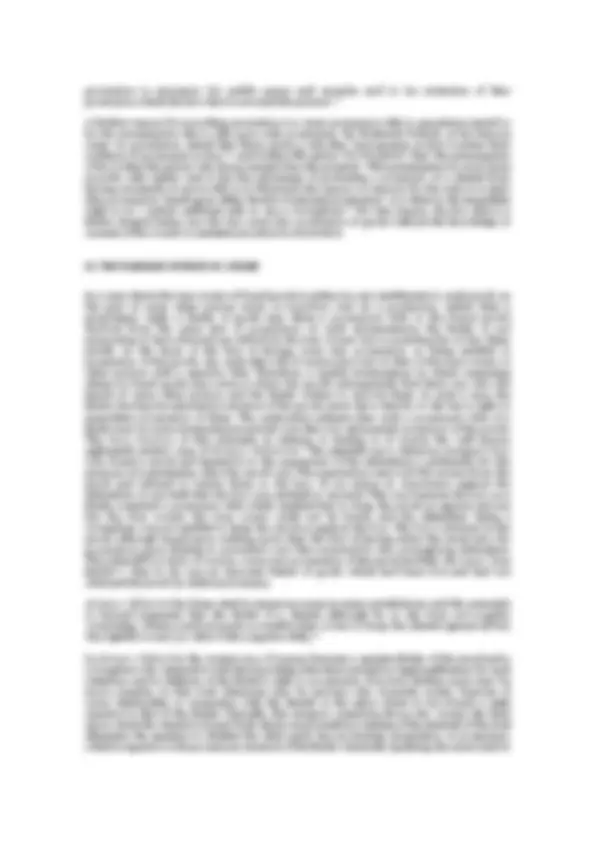
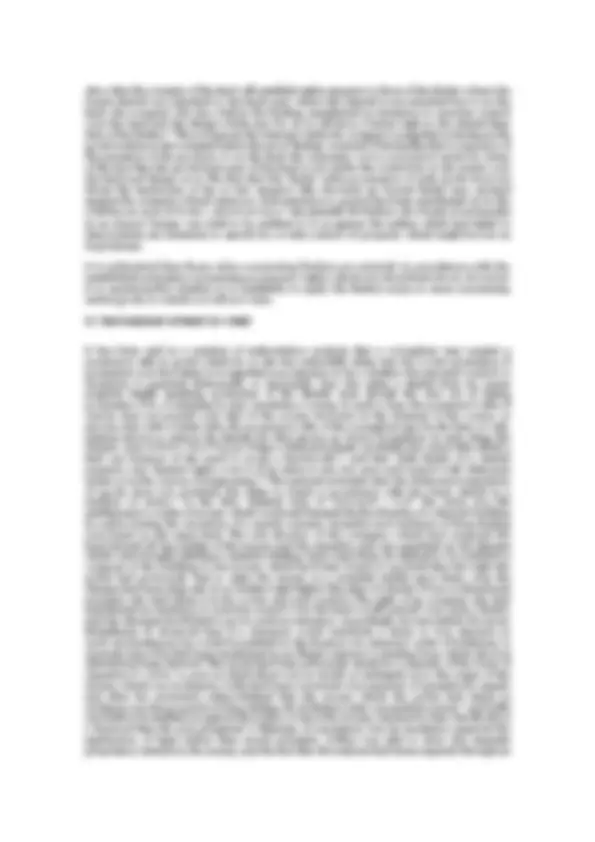
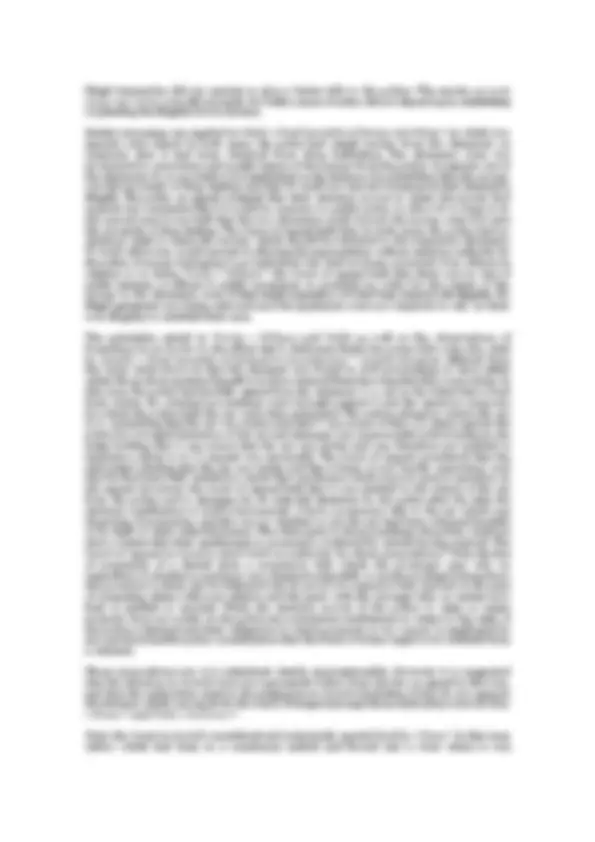
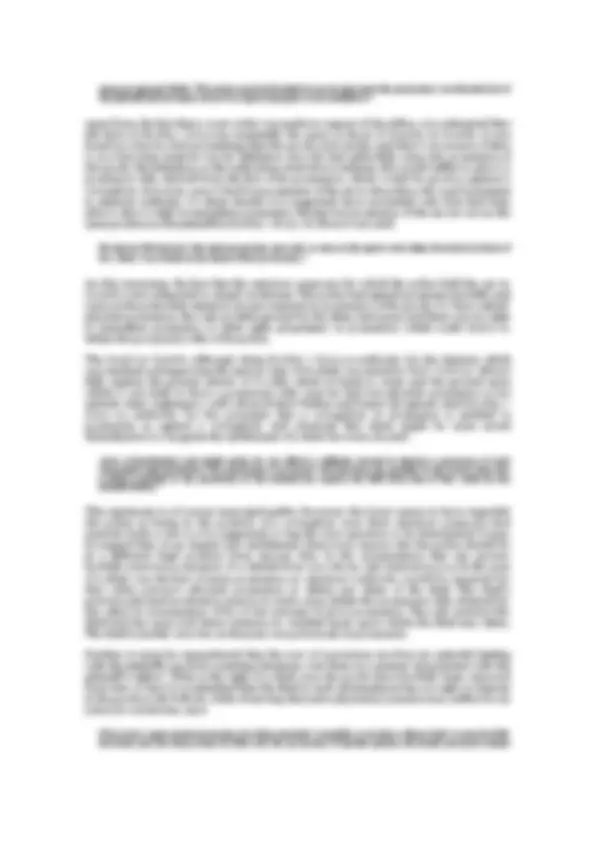

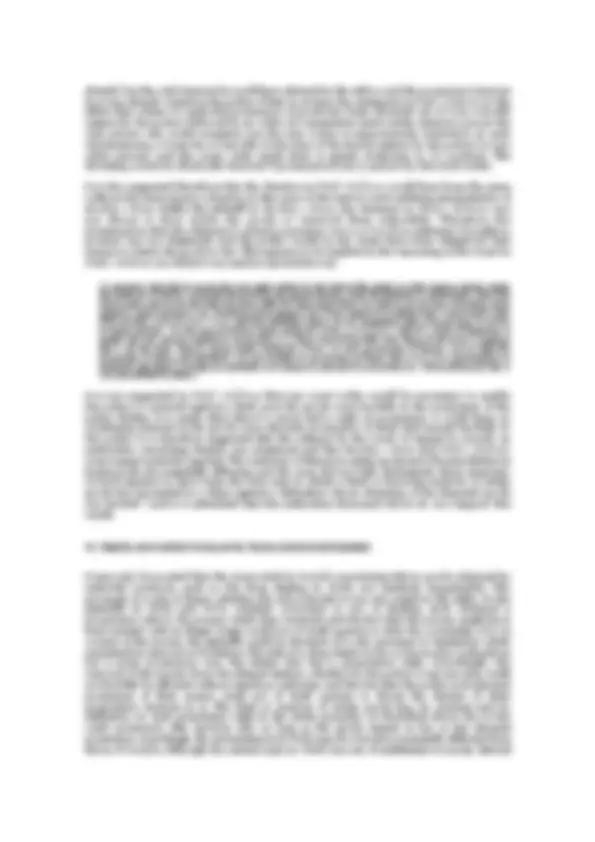




Study with the several resources on Docsity

Earn points by helping other students or get them with a premium plan


Prepare for your exams
Study with the several resources on Docsity

Earn points to download
Earn points by helping other students or get them with a premium plan
Community
Ask the community for help and clear up your study doubts
Discover the best universities in your country according to Docsity users
Free resources
Download our free guides on studying techniques, anxiety management strategies, and thesis advice from Docsity tutors
The legal principles surrounding the right to sue in conversion, focusing on the relationship between possession and ownership. The text examines the case of Costello v Chief Constable of Derbyshire and questions its reasoning regarding the rights of finders, thieves, and other unlawful possessors. It also explores the concept of possessory title and the implications for a person's right to immediate possession. insights into the historical background of these legal concepts and their significance in modern law.
What you will learn
Typology: Slides
1 / 14

This page cannot be seen from the preview
Don't miss anything!









Canterbury Law Review [Vol 11, 2005]
Senior Lecturer in Law, School of Law, University of Canterbury.
In certain circumstances the law has seen competing claims made to goods by persons who do not own them and who have come into possession of them without the consent or knowledge of the owner of them. Such claims may be made, typically, where goods which have been lost by their owner are found by someone who takes possession of them; or where goods have been stolen and are in the possession of the thief or a person who has received or taken them from the thief. In such cases, of course, the proprietary title of the owner remains paramount but, in the absence of an owner to assert such a claim, the question of entitlement to found or stolen goods may be disputed by other parties who have taken possession of the goods, dealt with them in some way or had some relation to them. In such disputes, legal proceedings, usually in conversion, may be undertaken by the plaintiff with the purpose of establishing an interest in the goods sufficient to prevail over any claimed interest of the defendant.^1 The purpose of this paper is to discuss the interests involved in cases of found and stolen goods, and to describe the way in which the law deals with rival claims in such cases. The nature of the possessory right necessary to found a successful conversion action in the absence of the true owner of goods is central to such a discussion, and an attempt will be made to analyse the principles involved in this context in establishing such a right. In particular, this paper revisits and questions the correctness of the reasoning in Costello v Chief Constable of Derbyshire,^2 which equated the interests of finders, thieves and other wrongdoers; and concludes that the decision failed to make the necessary distinction between the respective rights in goods of finders, thieves and others who are in possession of unlawfully obtained goods.
The right to immediate or physical possession of goods is not always a necessary incident of ownership of them. Although ownership of goods may be vested in a particular person, he or she may have transferred the right to possession of them to some other person by, for example, some form of bailment such as a lease or hire purchase. In such cases there are of course two different kinds of interests simultaneously in existence in respect of the same goods; ownership is vested in one party, and possession in the other. In agreements of this kind, the bailee, being entitled to possession pursuant to the agreement, may maintain an action in conversion against a third party who converts the goods. This is because the essence of the tort of conversion is that the defendant's conduct is inconsistent with the plaintiff's right to possession of the goods, and encroaches on the plaintiff's rights by excluding him or her from the use and possession of them. In effect, the defendant must be shown to have deprived the plaintiff of possession of the goods.^3 Thus, the person who is entitled to complain of such deprivation is the one who is entitled to possession, and it is the interference with that possessory right which is the subject of the action in conversion. Therefore the plaintiff in conversion proceedings may or may not be the owner of the goods, and indeed a bailee entitled to exclusive possession may sue in conversion the owner of goods who has excluded him or her from it.^4 Of course the true owner of goods generally has the right to sue
in conversion, because a normal incident of ownership of goods is the right to possession of them.^5 However, the true owner may be unable to maintain an action in conversion if he or she has parted with the goods to another under an arrangement whereby the owner is not entitled to regain immediate possession. In such a case, the owner may lack the possessory title which is required for a right to sue in conversion, which will lie with the person to whom the owner has ceded the right and fact of possession. This is because a person claiming in conversion must show the necessary possessory title. A possessory title may be established by proving either possession in fact or the immediate right to possession.^6 In this context, possession in fact, provided it is coupled with the manifest intention of sole and exclusive dominion over the chattel in question, always constitutes possession in law.^7 Whether or not there exists a right to immediate possession may be a more legally complex question, but it is clear that the existence of this right confers a right to sue in conversion.^8 The facts constituting possession generate rights as truly as do the facts which constitute ownership, although the rights of a mere possessor are less extensive than those of an owner.^9 The principle that a non‐owner in lawful possession of goods is entitled to sue in conversion is of respectable antiquity. For example, in the seventeenth century case of Wilbraham v Snow^10 it was held that a sheriff who had seized goods in execution of a writ of fieri facias could maintain an action of trover against the defendant, a person who had taken the goods from him. The sheriff had a right of possession under the writ and so was entitled to the return of the goods from the defendant. The entitlement to possession was a special property in the goods which the sheriff could assert against the defendant who had wrongfully converted the goods to his own use. Many cases have affirmed this principle in respect of other bailees in possession.^11 What is necessary is that the plaintiff in each case should be considered to have, legally speaking, a sufficient property or interest in the goods which are the subject of the claim, such property or interest being derived from the plaintiff's possession or right to possess.
Case law indicates that it is not necessary that the plaintiff's possession or right to possession should derive from a contractual relationship, such as a hire or carriage of goods, or be based upon legal justification such as a writ, as occurred in Wilbraham v Snow. A mere general bailment which gives the plaintiff possession of the goods with the consent of the owner is sufficient. So a borrower may sue in conversion.^12 In Sutton v Buck,^13 a case decided in 1810, a 'purchaser' who took possession of a ship under an invalid sale was similarly entitled. In that case, the owner of a stranded ship sold the ship as she lay to the plaintiff, who paid the purchase price. In fact the sale was not registered as required by legislation and the sale was void. The plaintiff expended time and money in attempting to refloat the ship. His efforts were unsuccessful and the ship broke up. Parts of the wreck drifted onto the land of a manor, the defendant bailiff of which took them and refused to return them to the plaintiff. The defendant argued that the plaintiff, not being the owner of the ship, did not have a sufficient title in the ship to maintain trover. The Court held that the plaintiff had been in possession of the ship with the consent of the owner, who had intended to transfer it to the plaintiff; and the fact of the plaintiff's possession was enough to defeat any right claimed by the defendant. The plaintiff's right to possession derived from the true owner and it made no difference that the purported sale had not resulted in property in the ship passing to the plaintiff. The position would have been the same had the owner made a gift of the ship to the plaintiff, said Mansfield CJ:
If [the owner] had said I give, or I abandon the ship to you, and the Plaintiff had said, I will endeavour to save her, and had laid out great sums of money, and failed, might a stranger come and take possession of a part? It would be a monstrous thing to say that he could do so.^14
Lawrence J colourfully agreed that the defendant was not entitled to keep the pieces of the wreck as against the plaintiff:
See to what length that argument would go! We should have lords of manors going on board vessels and saying, 'Here is a crew on board, but I know not the owner, and I will therefore break the ship to pieces.' All would be violence and outrage. 15
This concern to avoid a free‐for‐all is echoed in many cases^16 and is said to be one of the reasons that the law protects a possessory title. It has been suggested that such
show that the occupier of the land will establish rights superior to those of the finder where the found chattel was attached to the land; and, where the chattel is not attached but is on the land, the occupier who has, before the finding, manifested an intention to exercise control over the land and the things which may be on it will have a better right to the chattel than that of the finder.^26 This is because the interest which the occupier is regarded as having in the goods is taken to have existed before the act of 'finding' occurred. If the landholder is unaware of the presence of the goods in or on the land, the necessary animus possidendi exists by virtue of the fact that the goods form part of the land or are under the control he or she exerts over the land and things on it. The fact that the 'finder' takes possession of such goods does not divest the landowner of his or her superior title. However an honest finder may succeed against the occupier of land where no such intention to control has been manifested. So in the well known case of Parker v British Airways^27 the plaintiff, Mr Parker, who found a lost bracelet in an airport lounge, was held to be entitled to it as against the airline which had failed to demonstrate any intention to search for, or take control of, property which might be lost on its premises.
It is submitted that these rules concerning finders are entirely in accordance with the established principles concerning possessory rights which are described above. However it is questionable whether it is justifiable to apply the finders cases to cases concerning stolen goods, to which we will now turn.
IV. THE POSSESSORY INTEREST OF A THIEF
It has been said in a number of authoritative contexts that a wrongdoer may acquire a possessory title in goods which he or she has unlawfully taken into his or her possession. If possession is in fact taken it is regarded as possession in law whether the physical control or dominion is acquired dishonestly or innocently. One who takes a chattel from its owner acquires, legally speaking, possession of the chattel, even though the very act of taking possession of it, or retaining it, may constitute a wrong. In such a case, the possessor's title of course does not prevail over that of the owner. However in the absence of the owner, or anyone else with a better title, the possessory title of the wrongdoer may be the best, or only, interest shown to exist in the chattel. For this reason, in Parker, Donaldson LJ said, citing the Ontario case of Bird v Fort Frances,^28 that a dishonest finder 'probably has some title, albeit a frail one because of the need to avoid a free‐for‐all';^29 and that '[t]he finder of a chattel acquires very limited rights over it if he takes it into his care and control with dishonest intent or in the course of trespassing.'^30 The general principle that the dishonest acquisition of goods does not preclude the right to assert a possessory title has been stated in a number of cases.^31 In the New Zealand case of Tamworth v A G^32 the issue was the entitlement to a cache of money which was found beneath the floorboards of a disused building by police during the execution of a search warrant. Cannabis and evidence of drug dealing was found on the same land. The sole director of the company which had occupied the land denied all knowledge of the money and the cannabis, and was acquitted on the charges which were brought relating to cannabis dealing. Some years later, he claimed to be entitled as occupier of the building to the money which had been found. It was held that the right the police had previously had to seize the money as a potential exhibit gave them, once the charges had been disposed of, no further right higher than that of a finder of lost or abandoned property who had taken it in his or her care and control. The right of an occupier who had manifested an intention to exercise control over the land would prevail over such a finder, and the claimant had failed to prove such an intention. Accordingly, his case failed. However, Eichelbaum CJ observed that if a claimant could establish a claim to lost chattels in such circumstances, he would be entitled, in the absence of a statutory order of forfeiture, to succeed even if he had been implicated in an illegal contract or dealing from which the lost chattel had been derived. This point had been previously stated by a majority of the Court of Appeal in R v Collis,^33 a case in which there was no doubt or ambiguity as to the origin of the money which was in dispute. Collis had been convicted of possession of cannabis for supply and after his conviction acknowledged that the money which the police had taken as evidence was the proceeds of drug dealing. No forfeiture order was made however,^34 and Collis was held to be entitled, as against the police, to have the money returned to him. Hardie Boys J observed that the case presented 'a dilemma of conscience', but its resolution required the application of legal rather than moral principle. Collins was able to show the requisite proprietary interest in the money, and the fact that the interest had been acquired through an
illegal transaction did not operate to give a better title to the police. The maxim ex turpi causa non oritur actio did not apply, for Collis's cause of action did not depend upon establishing or pleading the illegality for its success.
Similar reasoning was applied in Webb v Chief Constable of Mersey side Police,^35 in which two appeals were heard. In both cases, the police had seized money from the claimants on suspicion that it had been obtained from drug trafficking. The claimants were not prosecuted to conviction and sought return of the money from the police. As against one of the claimants, W, it was held to be established on the balance of probabilities that the money was the proceeds of drug dealing and that W could not recover it because he had obtained it illegally. The police, on appeal, accepted that their statutory power to retain the money had expired, but contended that it would be contrary to public policy to allow W to keep it. In the second case it was held that the two claimants could recover the money even if it were the proceeds of drug dealing. The Court of Appeal held that, in both cases, the police had no statutory right to retain the money, which should be returned to the respective claimants. To hold otherwise would amount to allowing the expropriation without statutory authority by the police of money belonging to an individual who had not been convicted of an offence in relation to it. Citing Tinsley v Milligan^36 the Court of Appeal held that there was no test of public interest, or affront to public conscience, to preclude an order for the return of the money to the claimants, even if their initial acquisition of it had been tainted with illegality. No illegal agreement was being enforced and the applicants were not required to rely on their own illegality to establish their case.
The principles stated in Tinsley v Milligan and Webb as well as the observations of Donaldson LJ in Parker to the effect that a dishonest finder has some title were also cited in Costello v Chief Constable of Derbyshire Constabulary.^37 Costello however differed from the cases cited above in that the claimant was found in civil proceedings to have either stolen the goods in question himself or to have received them knowing that they were stolen. In that case, the police had lawfully seized from the claimant, C, a car in the belief that it had been stolen. No criminal proceedings were brought against C and the statutory purposes for which the police held the car were then exhausted. The police refused to return the car to C, contending that the car was stolen and that C was aware of that. C's claim against the police for wrongful detention of the car and damages was unsuccessful at first instance, the judge holding that C was aware that the car was stolen and was therefore not entitled to maintain a claim to it. C's appeal was successful. The Court of Appeal considered that the trial judge's finding that the car was stolen and that C knew it was 'hardly surprising', and that he had been fully entitled to reach that conclusion which was not open to question on the appeal. However, the Court of Appeal held that C was entitled to the return of the car from the police and to damages for its unlawful detention by the police after the date the statutory justification to hold it had passed. C had a possessory title to the car which was deserving of protection, and this was so whether or not the car had been obtained lawfully or by theft or other unlawful means. The other party to the proceedings, the police, could not show a better title, their entitlement to possession conferred by statute having expired. The Court of Appeal in Costello cited Webb as authority for three propositions.^38 First, the fact of possession of a chattel gives a possessory title which the possessor may rely on regardless of whether possession was obtained unlawfully or under an illegal transaction; the possessor's claim can be defeated only by proof of a superior title. Second, in the case of competing claims, titles are relative and the party with the stronger title, no matter how frail, is entitled to succeed. Third, the statutory power of the police to seize or retain property does not confer on the police any permanent entitlement to retain it; the right of the police is limited and their obligation to return property to its 'owner' is unaffected by any perceived public policy consideration that the fruits of crime ought to be withheld from a criminal.
These propositions are, it is submitted, clearly unexceptionable. However it is suggested that the decision in Costello does not necessarily follow from the law as stated in this way, and that the authorities cited in the judgments in Costello (including Webb) do not support the decision which was made by the Court. Principal amongst these authorities were Buckley v Gross 39 and Field v Sullivan. 40
First, the Court in Costello considered and extensively quoted Buckley v Gross.^41 In that case, tallow which had been in a warehouse melted and flowed into a river where it was
that prima facie presumption is rebutted, and there is nothing in principle or in reason to prevent B in an action by A from setting up that A was not entitled to them.^46
In Field v Sullivan, there being nothing to rebut the presumption that the plaintiff was the owner of the goods, the plaintiff was entitled to possession of them after the authority of the police to retain them was exhausted. Macfarlan J explained Buckley v Gross in this narrow way:
The real decision in Buckley v Gross, in my opinion, goes no further than this: Where A has feloniously or unlawfully taken possession of goods shown to be the property of a third person, who is known, and that possession has been divested out of A by a lawful seizure by the police, followed by an order of a magistrate made under statutory power, the goods are held by the police for the true owner, and if the police wrongfully (that is, without the authority of the true owner) dispose of the goods to C, the only person who can complain is the true owner.^47
It is suggested that the decision in Costello does not follow from, and is not consistent with, the authorities cited; and nor does it accord with the principles relating to possessory title which are discussed above. The reason for this, it is submitted, is that in Costello the principle that a thief has a possessory interest was applied without a full examination or analysis of the precise nature of the interest. As discussed above, a sufficient possessory right to succeed in conversion may be based upon either the fact of physical possession or the right to immediate possession. The judgments in Costello do not sufficiently distinguish these two possible circumstances but tend to the view that the fact of previous physical possession, albeit unlawful, suffices to confer a right to immediate possession. In consequence, the effect of Costello is to place thieves and knowing receivers of stolen goods in the same position, legally speaking, as honest finders; and the interests of those who have proprietary interests in goods, although obtained by unlawful transactions, are similarly conflated. It is submitted that this result cannot be right.
It is suggested that the possessory interest of a thief is different in nature from that of a finder, and that this is apparent from an examination of the authorities. It must be borne in mind that the law protects de facto possession because it is an indicator of a right to possess. In the case of an honest finder of a chattel, the appearance of a right to possess it accords with the reality of the position, for such a person obtains not only the physical possession of it, but also, in the absence of a better title in a third party being shown, the right to possess it. For this reason the finder who loses, or hands over for a limited purpose, physical possession, as in Armory v Delamirie and Parker v British Airways, will be entitled to recover the goods for the reason that he or she is the person, as against a wrongdoer, who has the better right to immediate possession. The finder's physical possession was originally obtained lawfully and that right is not broken by the intercession of a wrongdoer.
By contrast, the possessory title of a thief or knowing receiver of stolen goods is based upon no more than the physical fact of possession. The appearance does not match the reality, and the thief, although in fact in possession of the goods, has no other right to possess them. Such a title has been judicially described, as stated above, as 'some title, albeit a frail one because of the need to avoid a free‐for‐all';^48 and 'bare naked possession'.^49 It is suggested that the possessory title of a thief is so described because the thief at no time acquired a right to possession of the stolen goods, and the only basis upon which any title can be asserted is that of physical possession. Once that is lost to a person who obtains lawful possession of the goods in question, there remains no foundation for the thief to claim a right to regain possession or any other residual interest in the goods. This view, it is submitted, is supported by the dictum of Compton J in Buckley v Gross:
It is clearly established that possession alone is sufficient to maintain trover or trespass against a wrong doer who takes property from a person having possession of it. It is not clear, however, that the plaintiff ... was a finder of it within the principle of Armory v Delamirie and other cases. I think, on the evidence and the inferences to be fairly drawn from it, that he is more in the position of a person who has unlawfully or feloniously, perhaps the latter, obtained possession of it, whereas I look on the term finder in those cases to
mean an innocent finder. This action must be founded on possession; here the possession was divested out of the plaintiff, and he cannot revert to a right of property to re‐establish it.^50
Apart from the fact that a court order was made in respect of the tallow, it is submitted that the facts of Buckley v Gross are essentially the same as those of Costello. In Costello, it was found as a fact in civil proceedings that the goods were stolen, and that C was aware of that. C, as a knowing receiver was by definition one who had unlawfully come into possession of the goods. Nevertheless, as the authorities cited above indicate, this would suffice to give C a possessory title, derived from the fact of his possession, which would be good as against a wrongdoer. However, once C had lost possession of the car to the police, who took it pursuant to statutory authority, C's claim should, it is suggested, have succeeded only if he had been able to show a right to immediate possession. Having lost possession of the car, he was in the same position as the plaintiff in Buckley v Gross, of whom it was said:
He had no title beyond what mere possession gave and, so soon as the goods were taken from him by force of law, there was a break in the chain of that possession.^51
On this reasoning, the fact that the statutory purposes for which the police held the car in Costello were exhausted is simply irrelevant. The police had gained possession lawfully and were, at the point their statutory powers expired, in possession of the goods. C's 'bare, naked' physical possession, the only possible ground for his claim, had gone; and there was no right to immediate possession or other right, proprietary or possessory, which could revive to defeat the possessory title of the police.
The Court in Costello, although citing Buckley v Gross as authority for the decision which was reached, and approving the narrow ratio of it which was stated in Field v Sullivan, did not fully explain the precise nature of C's title which it found to exist; and the ground upon which C was held to have a possessory title once he had lost physical possession is not entirely clear. Lightman J, with whom Robert Walker and Keene LJJ agreed, cited Buckley v Gross as authority for the principle that a wrongdoer in possession is entitled to possession as against a wrongdoer, and observed that there might be some moral disinclination to recognise the entitlement of a thief. However, he said:
such a disinclination and public policy do not afford a sufficient ground to deprive a possessor of such recognition and protection. This conclusion is in accord with that long ago reached by the courts that even a thief is entitled to the protection of the criminal law against the theft from him of that which he has himself stolen.^52
This statement is of course unexceptionable. However, the Court seems to have regarded the police as being in the position of a wrongdoer once their statutory purposes had expired. Such a view is, it is suggested, to beg the very question to be determined. It may be argued that, in an inquiry into entitlement, there is no reason why the police should be in a different legal position from anyone else. In the circumstance that any person lawfully removes possession of a chattel from one whose only interest in it, as in the case of a thief, was the fact of mere possession, no statutory authority would be required for that other person's physical possession to defeat any claim of the thief. The thief's previous physical possession cannot, in such a case, defeat the possessory title obtained by the other in consequence of his or her present de facto possession. The only interest the thief had has gone and there remains no residual basis upon which the thief may claim. The thief is merely one who, in the past, was previously in possession.
Further, it must be remembered that the tort of conversion involves an unlawful dealing with the plaintiff's goods by asserting dominion over them in a manner inconsistent with the plaintiff's rights.^53 What is the right of a thief once the goods have lawfully been removed from him or her? It is submitted that the thief in such circumstances has no right or interest in the goods at all. Pollock, while observing that mere physical possession may suffice for an action in conversion, says:
If however a mere actual possession of a thing acquired wrongfully or existing without right is once lawfully devested, and the thing comes lawfully into the possession of another person, the former possessor cannot
already lost the only interest he could have claimed in the tallow and the possessory interest in it was already vested in the police. If that is correct, the statement in Field v Sullivan to the effect that where A's unlawful possession of goods has been divested out of A by a lawful seizure by the police, followed by an order of a magistrate made under statutory power the only person who could complain was the true owner is unnecessarily restrictive. In such circumstances, A loses his or her title at the time of the lawful seizure by the police (or any other person) and the court order made later is simply irrelevant to A's position. The divesting occurs by the lawful removal of possession from A, and not by the court order.
It is also suggested therefore that the decision in Field v Sullivan would have been the same without the unnecessary adoption in that case of the narrow and confining interpretation of Buckley v Gross. Unlike the plaintiff in Buckley v Gross, the claimant in Field v Sullivan was not shown to have stolen the goods or received them unlawfully. Therefore the presumption that the claimant's actual possession was a prima facie indicator of a right to possess was not displaced; and the police would in any event have been obliged for that reason to return the goods to her. This appears to be implicit in the reasoning of the Court in Field v Sullivan, in which it was said (as quoted above):
A's property and right to possession are made subject to the right of the police or other person seizing under the authority of the law to detain them during the period during which the detention is authorised; when that time expires, and no lawful order has been made for their disposition, his right to possession, if nothing more appears, again operates. I say 'if nothing more appears' for it may appear by evidence that A never had a right of possession, as in Buckley v Gross, and that therefore there was no suspended right of possession to revive or again operate ... In the case of seizure under authority of law, prima facie, when B' s right of detention is ended, the only person entitled to possession is A, from whom B lawfully took them. If, however, it appears that A (at the time when B, acting under authority of law, so took possession of them), was in unlawful possession of them, and therefore was not entitled to possession of them, that prima facie presumption is rebutted, and there is nothing in principle or in reason to prevent B in an action by A from setting up that A was not entitled to them.^58
It is not suggested in Field v Sullivan that any court order would be necessary to enable the police to succeed against a thief once the goods were lawfully in the possession of the police. Rather, it is made clear that if A never had a right of possession, A could have no continuing interest in the goods once physical possession of them had passed lawfully to the police. It is therefore suggested that the reliance by the Court of Appeal in Costello on authorities concerning finders was misplaced and that Buckley v Gross and Field v Sullivan were inappropriately applied. The interests of thieves in stolen goods and of honest finders in found goods are essentially different and the case did not fully distinguish these interests. Costello appears to have been the first case in which a thief or knowing receiver of stolen goods has succeeded in a claim against a defendant whose obtaining of the disputed goods was lawful;^59 and it is submitted that the authorities discussed above do not support this result.
It may also be posited that the cases cited in Costello concerning title to goods obtained by unlawful contracts, such as the drug dealing in Webb, are similarly inapplicable. The proceeds of a sale of drugs, whether the sale is lawful or not, are vested in the seller. So the plaintiffs in Webb and Collis, whether convicted or not of dealing, each obtained a proprietary title to the money which they received; and the fact that the money might have been tainted with an illegal origin could not of itself operate to alter the ownership of it. As owners of the money, the plaintiffs could be divested of it only pursuant to legislation which permitted its removal or forfeiture. The title of a drug dealer to his or her money is therefore not a mere possessory one; the dealer also has a proprietary right. Accordingly, the removal of the money from the alleged dealers, whether by the police or anyone else, could not lawfully be effected without statutory authority; and the fact that the police took physical possession of their money could not of itself operate to divest the dealers of their proprietary interest in it. The thief or receiver of stolen goods has, by contrast and by definition, no such proprietary right in the stolen property. As described above, his or her weak possessory title survives only as long as the goods remain in his or her physical possession. Accordingly, the circumstances in Webb may be viewed as essentially different from those of Costello. Although the central issue in Webb was one of entitlement to money derived
from drug dealing, the question for the Court was in reality whether there was some principle of law or public interest which would justify the police in retaining money which belonged to a plaintiff but which had been illegally obtained by him or her. The issue was essentially one relating to forfeiture of goods, and not title. The question was therefore not the same as that before the Court in Costello, which was required to determine which of two asserted possessory titles should prevail in circumstances where no proprietary rights were established or claimed. No question of unjustified expropriation by the police could arise in Costello for C, having lost his possessory interest, had no longer had any title or interest which could be the subject of any such expropriation.
The principle that physical possession is sufficient title to sue a wrongdoer in conversion is well established and has been applied in many contexts. Its application to finders of goods which belong to unknown owners entirely accords with that principle and the reasons for it. However it is submitted that the decision in Costello actually contravenes the principle. By placing on the same footing thieves, honest finders and those with proprietary interests tainted with illegality, the Court in effect accorded to a past, merely physical and unlawful possession (that of the thief) priority over a present and lawfully obtained possession (that of the police). Such a finding, it is suggested, subverts rather than supports the principle that physical possession merits protection as against a wrongdoer.
26 See the rules listed by Donaldson LJ in Parker v British Airways [1982] 1 QB 1004, 1017‐ 1018 (CA); Tamworth Industries Ltd v A G [1991] 3 NZLR 616; Waverley Borough Council v Fletcher [1995] 4 All ER 756 (CA).
27 [1982] 1 QB 1004; [1982] 1 All ER 834 (CA).
28 [1949] 2 DLR 791.
29 [1982] 1 QB 1004, 1009 (CA).
30 Ibid 1017. See also the authorities cited in Bird v Fort Francis [1949] 2 DLR 791, 795; Field v Sullivan [1923] VLR 1 (FCA); Irving v National Provincial Bank Ltd [1962] 2 QB 73 (CA); Tamworth Industries Ltd v A G [1991] 3 NZLR 616.
31 The principle is sometimes referred to as 'the Bowmakers principle' because the distinction between a claim based upon proprietary or possessory rights and one based upon contractual rights was discussed in Bowmakers Ltd v Barnet Instruments Ltd [1945] KB 65; [1944] 2 All ER 579 (CA). See also Gordon v Chief Commissioner of Metropolitan Police [1910] 2 KB 1080.
34 The money had not been obtained 'in the course of or consequent upon' the possession offence, as required by s 23(3) of the Misuse of Drugs Act 1975.
35 [2000] QB 427.
36 [1994] 1 AC 340 (HL).
37 [2001] 3 All ER 150 (CA).
38 [2001] 3 All ER 150, 157 (Lightman J) (CA).
40 [1923] VLR 70.
41 (1863) 3 B & S 566.
42 Ibid 572‐3.
43 Ibid 573.
44 Ibid 574‐6.
45 [1923] VLR 70.
46 Ibid 84.
47 Ibid.
48 Parker v British Airways [1982] 1 QB 1004, 109 (Donaldson LJ), citing Bird v Fort Frances [1949] 2 DLR
49 Buckley v Gross (1863) 3 B & S 566, 572 (Cockburn CJ).
50 Ibid 573. See also Wilbraham v Snow 2 Wms Saund 47, in which it is said that, in the absence of physical possession, a stranger or wrongdoer cannot acquire sufficient property in the goods to maintain trover.
51 Ibid 573 (Cockburn CJ).
52 [2001] 3 All ER 150, 164 (CA).
53 Kuwait Airways Corporation v Iraqi Airways Co (Nos 4 & 5) [2002] 2 AC 883 (CA & HL);
54 Wilson v New Brighton Panelbeaters Ltd [1989] 1 NZLR 74
55 Above n 7, 148
56 See the cases on finding cited above, and Wilbraham v Snow 85 ER 624, 629 which hold that a special property arises simply out of lawful possession.
57 [1982] 1 QB 1004, 1008 (Donaldson LJ) (CA).
58 Ibid 837.
59 [1923] VLR 70, 84.
60 No court has ever allowed an admitted, or even a clearly proved, thief without a claim of right to recover, and it seems improbable that one ever will.': see Prosser, Handbook of the Law of Torts (4th ed, 1971) 94.